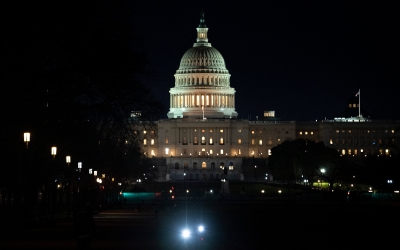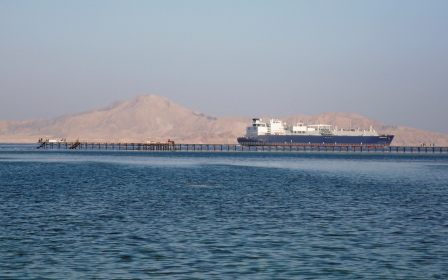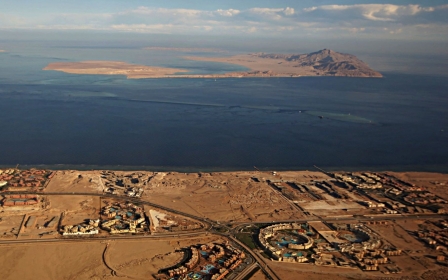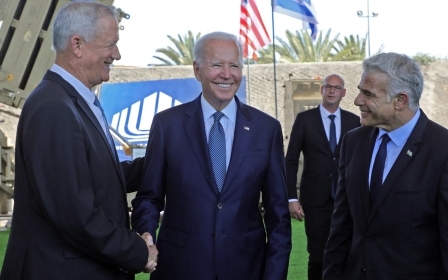The symbolic Red Sea islands at the heart of Biden's Saudi trip
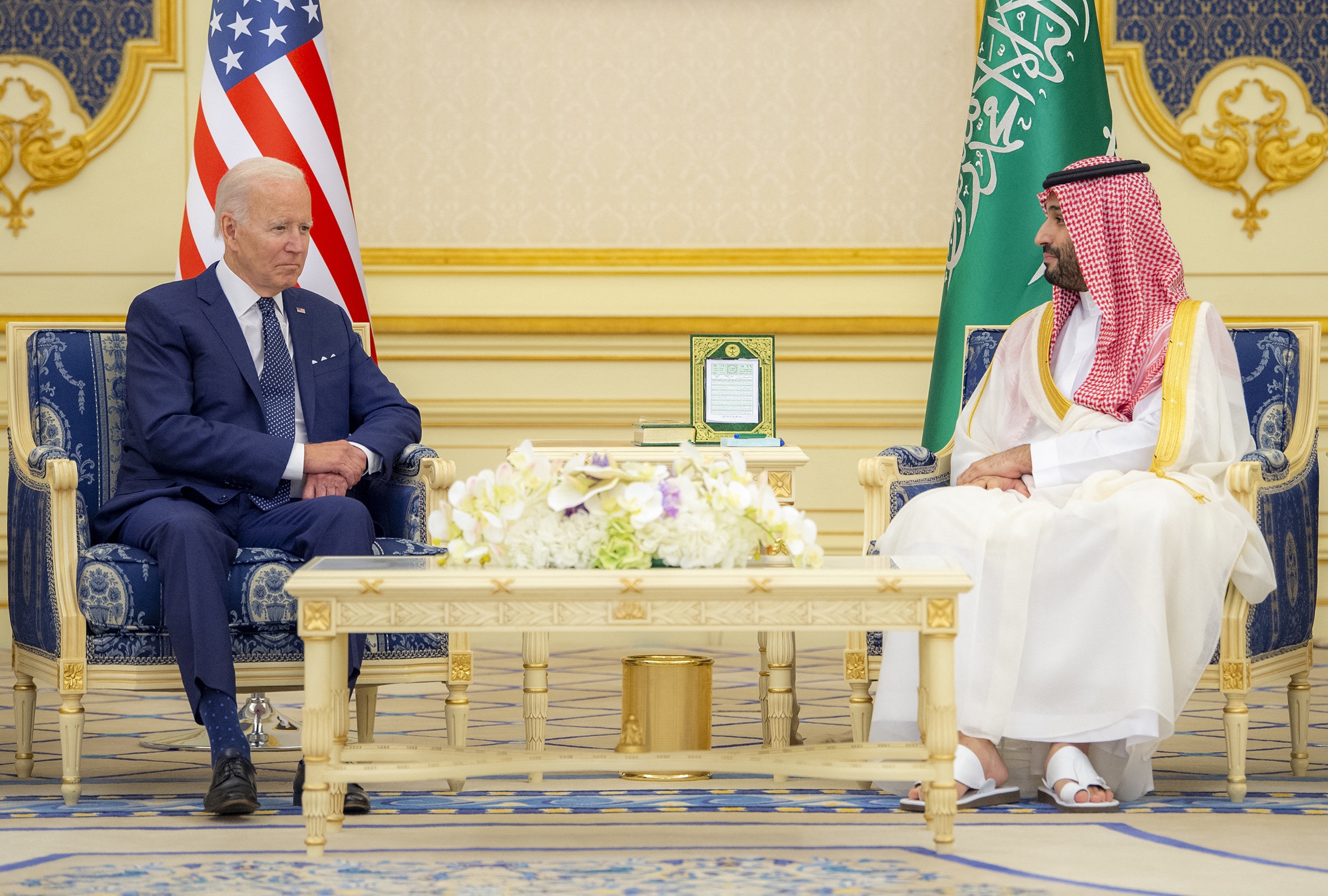
US President Joe Biden tried to chalk up some diplomatic wins during his controversial visit to Saudi Arabia, announcing a slew of accords with the kingdom, from a 5G rollout to plans for boosting oil supply, but one of the most anticipated centred on a pair of islands in the Red Sea.
For months, the US has been rumoured to be brokering a deal to transfer the Tiran and Sanafir Red Sea islands from Egypt to Saudi Arabia, and on Friday Biden said that international peacekeepers, including US troops, would leave Tiran by the end of the year.
The announcement cleared a hurdle for the deal, which analysts say could smooth the way for an eventual establishment of formal ties between Saudi Arabia and Israel, whose permission is required for any change in the status of international forces on the territory.
'Whenever you [the White House] have a visit like this, you want to polish up your fact sheet and put as many little nuggets into it as you can'
- Gerald Feierstein, former US ambassador
In exchange for Israel's agreement to the transfer of multinational peacekeeping forces, Saudi Arabia opened its skies to all Israeli airflights.
"We will see how Palestine fits into future negotiations, but the exchanges will be viewed as additional steps and confidence building efforts in the roadmap to normalisation," Adel Hamaizia, associate fellow with the Middle East and North Africa programme at Chatham House in London, told Middle East Eye.
New MEE newsletter: Jerusalem Dispatch
Sign up to get the latest insights and analysis on Israel-Palestine, alongside Turkey Unpacked and other MEE newsletters
Addressing reporters on Friday, Biden heralded the agreement as a "breakthrough," saying that the US and Saudi Arabia had "concluded a historic deal to transform a flashpoint at the heart of the Middle East wars into an area of peace".
But the islands' recent history has been slightly more uneventful than those words suggest.
While Israel occupied them during the six-day 1967 war, in 1979 they were demilitarised after Egypt and Israel signed the 1979 Camp David peace treaty. Since then, there has been limited tension around the islands.
Analysts say Israel has long moved past looking at potential Saudi control of the islands as a threat, especially in recent years as both have aligned against Iran, including in the Red Sea, where they participate in joint naval drills with the US.
"I don't recall the Israelis ever having a problem with the transfer," said Gerald Feierstein, a retired US ambassador and former principal deputy assistant secretary of state for near-east affairs, now senior vice president of the Middle East Institute.
"Whenever you [the White House] have a visit like this, you want to polish up your fact sheet and put as many little nuggets into it as you can," Feierstein said. "I suppose this is a nugget."
'A bridge too far'
Tiran and Sanafir were historically controlled by Saudi Arabia until the 1950s, when Riyadh transferred custody of them to Cairo. At the time, Egypt was the dominant economic and military power in the Arab world, and was seen as a better protector of such assets against Israel.
The islands' geographic position at the entrance to the Gulf of Aqaba made them a strategic choke point when Arab states went to war with the Jewish state. In 1967, Egyptian president Gamal Abdel Nasser closed the Strait of Tiran, cutting off maritime access to the Israeli seaport of Eliat.
But the peace between Egypt and Israel, along with the more recent budding normalisation of ties with Riyadh, places the islands in friendly territory.
"I don't think Tiran and Sanafir by themselves are that strategically significant today," David Schenker, former Middle East diplomat during the Trump administration and current fellow at the Washington Institute for Near East Policy, told MEE, pointing out that with new technology the peacekeeping force can monitor the straits from the mainland.
In 2017, Egypt agreed to cede control of the islands to Saudi Arabia. At the time, bilateral ties were strained over Egyptian President Abdel Fattah el-Sisi's reluctance to sign on to Saudi Arabia's war plans in Yemen and support for rebels fighting to remove Syrian President Bashar al-Assad.
Despite protests among many Egyptians who saw the islands as a symbol of national pride, the deal went through.
Saudi Arabia has pumped billions of dollars into Egypt's struggling economy, and the transfer came with the promise of more largesse, including a $4bn bridge designed to link the Sinai peninsula to Saudi Red Sea developments.
"There were promises about regional integration and connecting the tourism hubs of Saudi Arabia and Egypt," Robert Mogielnicki, senior resident scholar at the Arab Gulf States Institute, told MEE. "Today, Saudi Arabia is looking inward to its development, and that talk has faded away."
According to the White House, under the agreement to remove the peacekeepers the islands will be developed for tourism and other economic projects.
Saudi Arabia is indeed pushing ahead with plans to develop its Red Sea coast for tourism in order to diversify its economy away from petrodollars, but analysts are sceptical about what kind of impact acquiring the sparse, uninhabited islands will actually have.
"This is not something that has obvious economic benefits for the kingdom," Mogielnicki said.
Symbolism
"The islands are partly a matter of prestige for Riyadh," Hamaizia, at Chatham House, said. "It's another indicator that implicitly ratifies Saudi's status as the main player in the Arab world."
In that sense, the islands fit in with a presidential trip that has been high on symbolism. Biden travelled to Saudi Arabia despite previously vowing to make the country a pariah over human rights issues. Soaring energy prices at home and recent inroads by China and Russia into the kingdom led him to recalculate.
Signs of bad blood between Biden and de facto ruler Crown Prince Mohammed bin Salman were evident at Friday's press briefing, when Biden said he didn't regret his pledge to isolate the kingdom and repeated the claim that he was not visiting Saudi Arabia in order to meet the crown prince.
At the same time, Biden came under fire from progressives in his own party for the trip, with Democrats like Congressman Adam Schiff blasting the president's decision to fist bump with the crown prince on his arrival.
If the visit was uncomfortable for Biden, it marked a turning point for the 36-year-old Saudi leader, drawing a line under efforts to isolate him as he aims to assert the kingdom's power on the world stage.
The Red Sea island deal also signals the start of a normalisation process between Saudi Arabia and Israel.
"This is another touchpoint for Israel with Saudi Arabia and brings them a step closer to establishing official ties," former diplomat Schenker said.
This article is available in French on Middle East Eye French edition.
Middle East Eye delivers independent and unrivalled coverage and analysis of the Middle East, North Africa and beyond. To learn more about republishing this content and the associated fees, please fill out this form. More about MEE can be found here.


